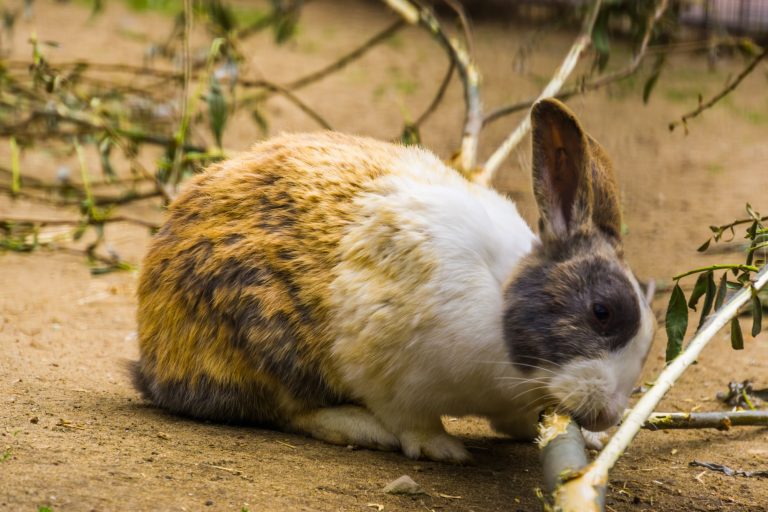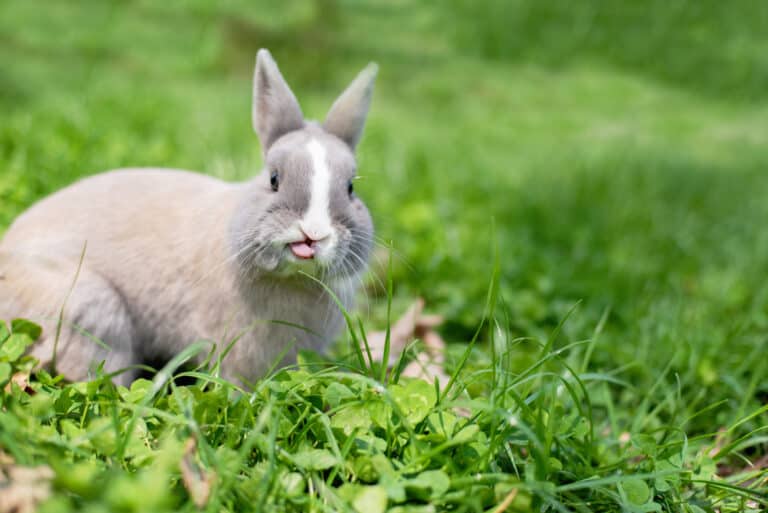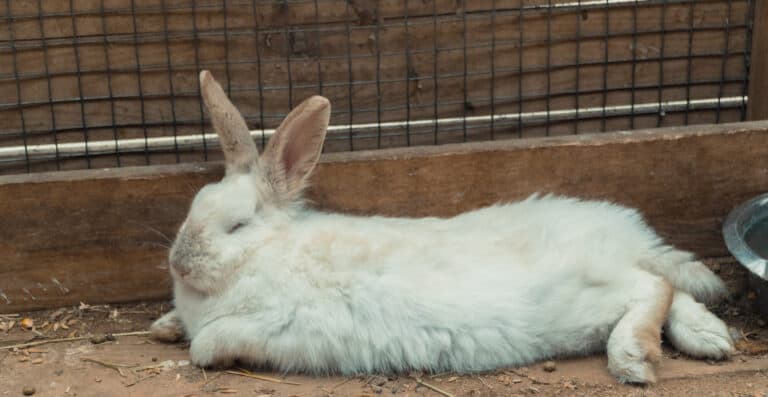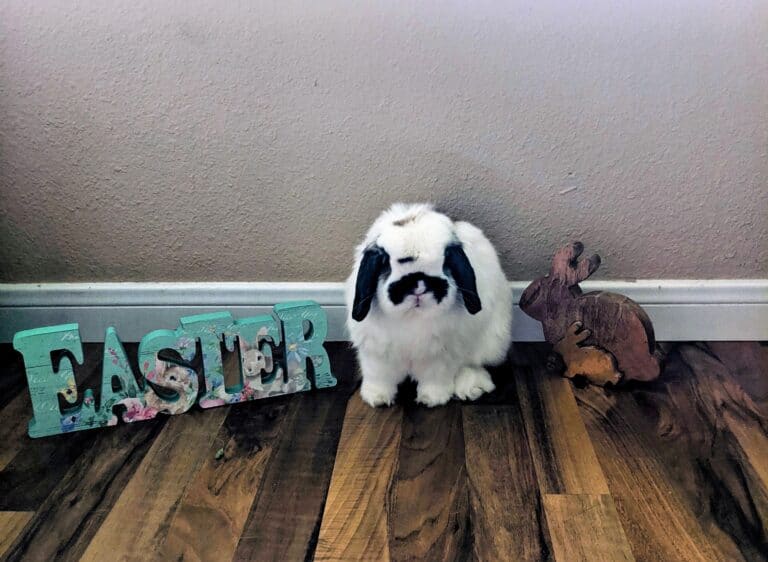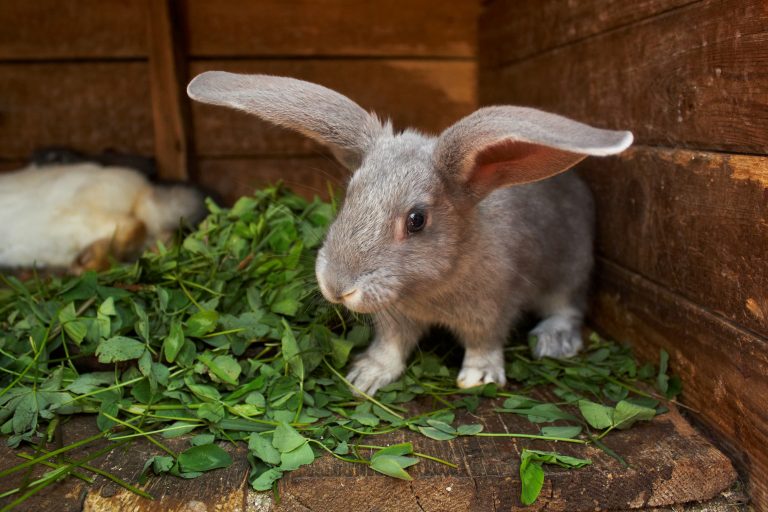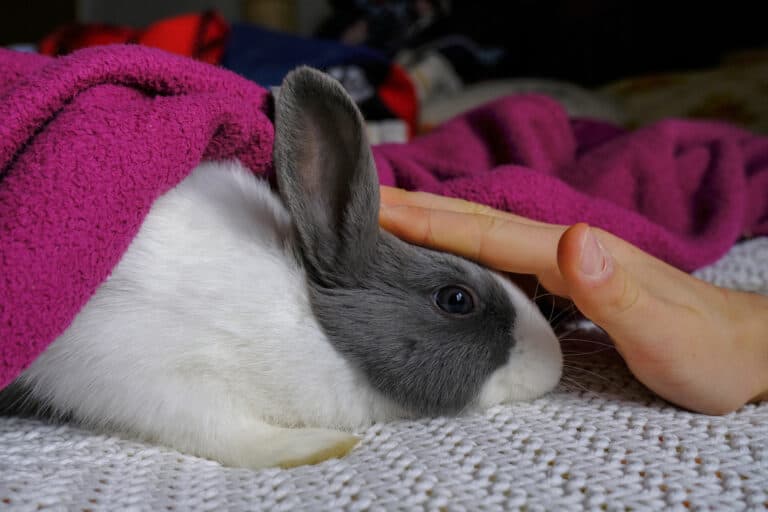Are Rabbits Born Blind?

Your bun’s eyes possess a fantastic quality. They can see nearly all the way around them. That’s due to their position high at the side of the head. But that impressive, almost 360-degree vision rabbits enjoy comes later. At birth, baby bunnies can’t see.
What? Are rabbits born blind, you ask. Let’s find out!
Baby Rabbits at Birth
Rabbits are tiny, furless creatures when they emerge from their mother’s womb, measuring only around 2 inches and weighing close to nothing. At this stage, they’re barely able to survive and still need to develop some more before they turn into the cute, fluffy bunnies that will melt your heart.
Being defenseless creatures, they instinctively burrow under their nest to avoid attracting the attention of predators. For the same reason, their mom doesn’t stay close by but instead feeds her bunnies (or kits) under cover of nighttime darkness.
At birth, rabbits’ eyes aren’t simply closed. Instead, they’re sealed shut, and the baby buns can’t open them even if they want to.

Why Are They Born Blind?
This is just another example of the many ways Nature takes to ensure the survival of the species.
The reasons why rabbits are born blind include the following:
To Help the Mommy Rabbit
Rabbits are prey animals, and a pregnant bun is a prime target for predators because she can’t move fast enough to escape. To help keep her alive, Nature shortened the gestation period so she could get her strength and agility back as quickly as possible.
However, their limited stay inside the womb doesn’t give her babies enough time to develop all their organs fully. Thus, they’re born deaf and blind. Further developments to their sight and hearing will occur in the outside world while they’re tucked in their warm nest.
To Protect the Baby Rabbit
Because the eyes aren’t fully developed at birth, the smallest things, such as bright lights and even a slight breeze, can harm those delicate peepers. So Nature sealed them shut to prevent any injuries.
The doe (or female rabbit) usually has a large litter. It’s not uncommon for her to give birth to as many as 12 kits. Those tiny babies squirm and wriggle around in their burrow. In the process, they can easily poke or scratch each other’s eyes, damaging the fragile organ.
How Long Before They Can See?
That depends on what you mean by seeing. Baby buns typically open their eyes 10-12 days after birth. But even then, they won’t be able to see very far. Their vision is still developing at this stage, and they can only clearly make out things that are up close, such as their mother and littermates.
After their eyes open, constant practice will fine-tune their ability to view far away objects and then shift their focus to things nearby. This strengthens the eye muscles and eventually gives buns the amazing ability to see almost all the way around them.
Kits usually stay in the nest for around 3 weeks. During such time, their vision slowly sharpens. Depending on factors such as breed and health, it may take a couple of months before they acquire the visual acuity needed to detect predators from as far as 20 feet.
Should We Help Them Open Their Eyes?
Your rabbit’s eyes stay close for a reason, so it’s best to let Nature take its course. Forcing those peepers open before they’re fully developed can have negative consequences, such as the destruction of the facial nerves, trauma to the eyelids or the eyes themselves. These could lead to blindness or even death in extreme cases.
Because their eyes are such delicate organs at birth, you should also avoid shining bright lights on your bun. Even with their eyelids shut, some of the light can seep through and harm their sight.
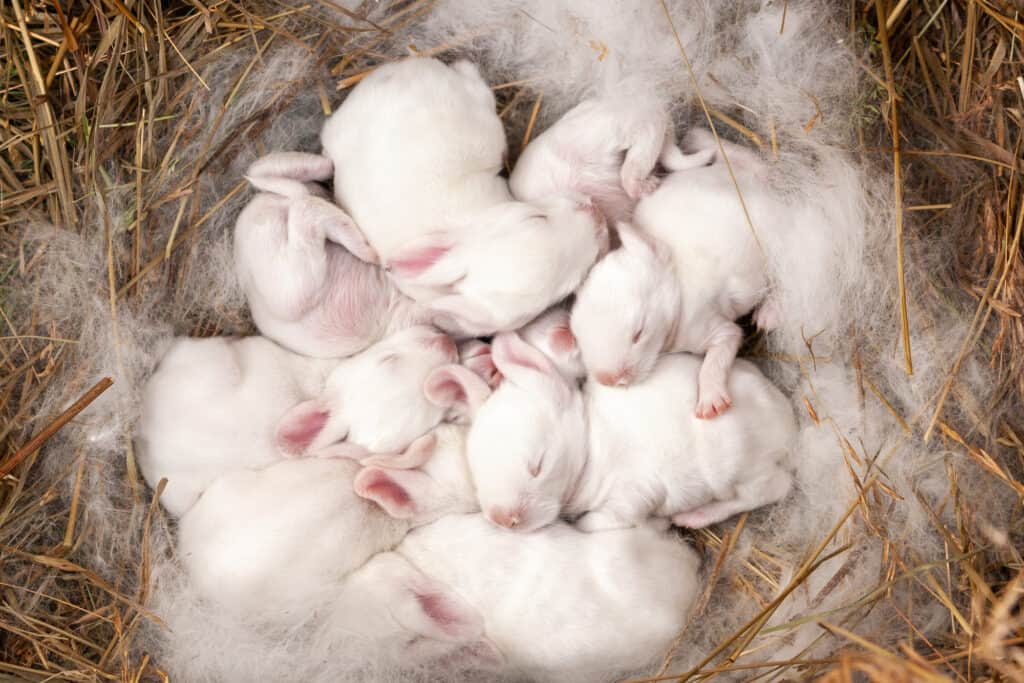
What If My Rabbit Won’t Open His Eyes?
If it’s been over 12 days and your pet’s eyes remain closed, you can consult a rabbit-savvy vet to air your concern. You may be asked to wait 2-3 days more and then bring your bunny for a check-up if those peepers still don’t open.
The issue typically arises because of certain conditions, such as the following:
- Congenital defects: Sometimes, something goes wrong in the womb causing nerve defects, problems with the eyelids and the eyes, or developmental delays.
- Mother rabbit’s poor milk quality: Health issues or lack of nutritious food, like fresh veggies and fruits, lowers the milk quality of the doe.
- Inability to nurse: Birth defects, such as cleft palates, may prevent the baby bunny from nursing, which leads to malnutrition.
- Underdevelopment or neurological damage: Injuries sustained inside the womb, or upon birth, deformity of the brain or nervous system, and early delivery may delay eye-opening in baby rabbits.
- Injuries to the kit: Rough handling by the mother, scuffles with their littermates, or encounters with predators can harm the kit, causing medical issues that prevent the eyes from opening.
- Medical concerns: Eye conditions such as conjunctivitis, infections, or nest box eyelids may keep the eyes sealed. Your vet will usually prescribe some medications, or in mild cases, warm compresses will be enough to resolve the problem.
- Genetics: The rabbit breed can sometimes influence how long it takes before the baby bunnies open their eyes.
Caring for Baby Rabbits
It’s best to leave the care of the newborn kits to their mother. However, to ensure that the bunnies are in good health, you can check on them regularly. The best time to do so is early in the morning. Well-fed buns have rounded bellies from their feeding and look content as they snuggle in their warm nest.
In contrast, hungry kittens are restless and may crawl all over their burrow. A wrinkled appearance caused by dehydration is another indication that the babies aren’t getting enough nourishment.
Mother rabbits don’t usually mind if you handle their babies. However, better play it safe and don’t make it a habit to lower the chance that the mother may harm the babies.
Yes, rabbits are born blind. It also takes a while before those tiny, hairless kits turn into the fluffy, adorable bunnies that emerge from their nest with their eyes fully open. In the meantime, you can focus on giving their mom the best of care. This helps ensure that her milk contains all the nutrition her babies need for optimum development.
More Info on Rabbit Care!
- How Long Do Flemish Rabbits Live: Giant Breed Facts
- Complete Guide to the Best Hay For Rabbits: Reviews & More
- Are Rabbits Rodents? Find Out More About These Small Mammals
- Is Oat Hay Good for Rabbits? Complete Guide to the Best Hay
- Why Do Rabbits Lick You? 11 Reasons for This Common Behavior
We hope you enjoyed this post! If you did, will you give it a share or two 🙂 Thank you! ~from Every Bunny Welcome


